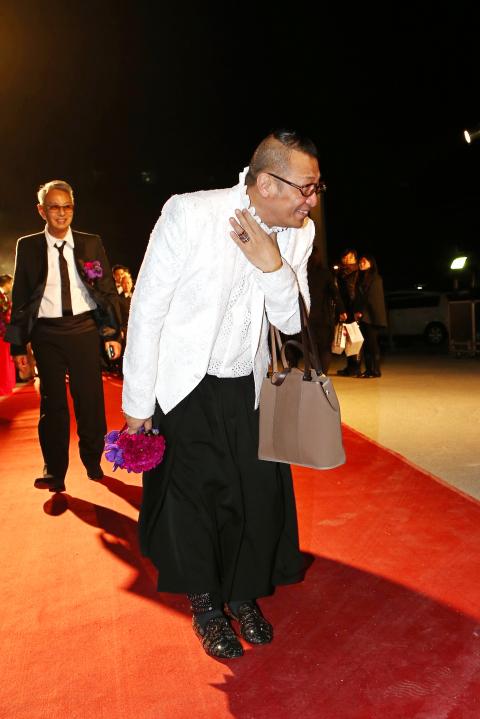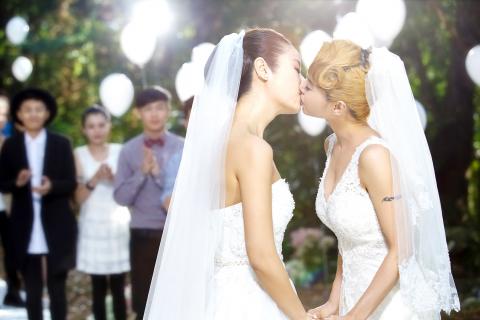As the year draws to an end, Taipei Watcher would like to thank readers for your support, as this columnist strives to raise awareness of lesbian, gay, bisexual and transgender (LGBT) issues and the various challenges facing them. And though challenges remain — Chinese Nationalist Party (KMT) Legislator Lu Hsueh-chang's (呂學樟) remarks on Monday at the Legislative Yuan that homosexuals are “scary” and that legalizing same-sex marriage is encouraging “bestiality” are just the latest example — positive signs have emerged for the LGBT community this year.
According to a survey by Gallup Inc, Taiwan was listed as the world’s 39th most LGBT-friendly country. Thirty-nine percent of respondents say the country is welcoming, while 42 percent say that it isn’t. Taiwan ranks second among all Asian countries surveyed, behind the Philippines, which is listed as the world’s 22nd most LGBT-friendly country.
The poll, conducted in 123 countries last year and released this year, saw 28 percent of respondents saying that their city or area is a “good place” for gays and lesbians to live. The world’s top three LGBT-friendly countries are the Netherlands, Iceland and Canada, where same-sex marriage is legally recognized. In 2001, the Netherlands became the world’s first country to legalize same-sex marriage.

Photo: Chen Yi-kuan, Taipei Times
“Hospitable attitudes range widely from as high as 83 percent in the Netherlands to as low as 1 percent in Pakistan and Senegal,” the poll says, adding that it was unable to conduct the survey in certain countries where homosexuality is legally banned, especially in some African and Muslim nations.
Take Taiwan’s neighboring country Indonesia for example. Only 2 percent of respondents say their country is a safe place for homosexuals to live. In September, lawmakers in the Indonesian province of Aceh even passed a law to punish gay sex publicly with 100 lashes.
ASIA’S BEST PLACE?

Photo courtesy of Warner Music
Taiwan is relatively friendly to LGBT people compared to most Asian countries. In October, the New York Times published a report, “For Asia’s gays, Taiwan stands out as beacon,” praising our open society. Gay Star News, an online news site, also released an article in 2012, “Why is Taiwan the best place to be gay in Asia?” in which it lauded our friendliness to homosexuals.
“Taiwanese culture is based on Confucianism, Taoism and Buddhism. Buddhists are very tolerant of almost everything because they think there’s a reason for it, so they have to respect it,” gay activist Nelson Chen (陳敬學) told the Web site.
“Another explanation is that because Taiwan has been occupied by the Dutch, the Spanish, China and Japan, Taiwanese have quickly adapted to different cultures. Also a lot of young Taiwanese go to study abroad and we get a lot of information from other countries because the Internet is not censored like it is in China,” Chen added.
Victoria Hsu (許秀雯), a lawyer and the CEO of Taiwan Alliance to Promote Civil Partnership Rights (伴侶盟) who was also interviewed, echoed Chen’s views.
“[Taiwan] is already a diverse society. So I think that’s one of the reasons we are a little bit more gay-friendly than some other Asian countries,” she said.
However, Hsu adds, discrimination against homosexuality now exists in a more subtle way.
“We don’t criminalize homosexual conduct in our Criminal Code — we don’t have such terrible laws. But in the employment area and some other areas there’s still a lot of discrimination against LGBT people,” she says.
GAYER MEANS HAPPIER
Gay Star News ran a report last year that showed that gay-friendly countries are the happiest in the world. It wrote that “countries that are highly accepting of gay people, and have progressive social attitudes towards homosexuality, rank highest in a list of the happiest nations in the world.”
The report was based on the Better Life Index — compiled annually by the Organization for Economic Co-operation and Development (OECD) — which ranked 36 countries according to 11 major criteria such as income, health and safety.
“Although a nation’s happiness is not measured primarily by support for their LGBT communities, all of the highest ranking countries are accepting of homosexuality, support equal rights and have laws protecting gay people,” the report wrote.
In a hope to make Taiwan a happier country too, six openly gay and lesbian candidates campaigned in the nine-in-one elections last month, hoping to build a gay-friendly environment. Unfortunately, they failed to get elected and only received a total of 19,152 votes.
On Dec. 6, “fashion godfather” Ivan Hong (洪偉明) and his boyfriend fashion designer Lu Fong-chi (呂芳智) held a wedding in Taipei to celebrate the 30th anniversary of their long-term relationship, and nearly 300 people, many of whom were celebrities, attended the party. The couple’s wedding caused a sensation. Two days later, the Chinese-language Apple Daily published an editorial praising their bravery, encouraging same-sex couples nationwide to hold weddings in public so more Taiwanese will pay attention to the issue. Isn’t it a pity that their union and all other same-sex couples’ unions are not legally recognized and protected in a nation that claims to promote human rights?
Last week, pop diva Jolin Tsai (蔡依林) released the music video of her new single, We’re All Different, Yet The Same (不一樣又怎樣), in which she held a same-sex wedding with actress Ruby Lin (林心如) to show her support for marriage equality (www.youtube.com/watch?v=C7hHofDW2ts). Statistics show that more LGBT-friendly countries are happier countries. Hopefully, Taiwanese can be inspired by Tsai’s effort and turn Taiwan into Asia’s most gay-friendly nation in the coming year, so all of us can live happier lives.

The primaries for this year’s nine-in-one local elections in November began early in this election cycle, starting last autumn. The local press has been full of tales of intrigue, betrayal, infighting and drama going back to the summer of 2024. This is not widely covered in the English-language press, and the nine-in-one elections are not well understood. The nine-in-one elections refer to the nine levels of local governments that go to the ballot, from the neighborhood and village borough chief level on up to the city mayor and county commissioner level. The main focus is on the 22 special municipality

The People’s Republic of China (PRC) invaded Vietnam in 1979, following a year of increasingly tense relations between the two states. Beijing viewed Vietnam’s close relations with Soviet Russia as a threat. One of the pretexts it used was the alleged mistreatment of the ethnic Chinese in Vietnam. Tension between the ethnic Chinese and governments in Vietnam had been ongoing for decades. The French used to play off the Vietnamese against the Chinese as a divide-and-rule strategy. The Saigon government in 1956 compelled all Vietnam-born Chinese to adopt Vietnamese citizenship. It also banned them from 11 trades they had previously

In the 2010s, the Communist Party of China (CCP) began cracking down on Christian churches. Media reports said at the time that various versions of Protestant Christianity were likely the fastest growing religions in the People’s Republic of China (PRC). The crackdown was part of a campaign that in turn was part of a larger movement to bring religion under party control. For the Protestant churches, “the government’s aim has been to force all churches into the state-controlled organization,” according to a 2023 article in Christianity Today. That piece was centered on Wang Yi (王怡), the fiery, charismatic pastor of the

Hsu Pu-liao (許不了) never lived to see the premiere of his most successful film, The Clown and the Swan (小丑與天鵝, 1985). The movie, which starred Hsu, the “Taiwanese Charlie Chaplin,” outgrossed Jackie Chan’s Heart of Dragon (龍的心), earning NT$9.2 million at the local box office. Forty years after its premiere, the film has become the Taiwan Film and Audiovisual Institute’s (TFAI) 100th restoration. “It is the only one of Hsu’s films whose original negative survived,” says director Kevin Chu (朱延平), one of Taiwan’s most commercially successful